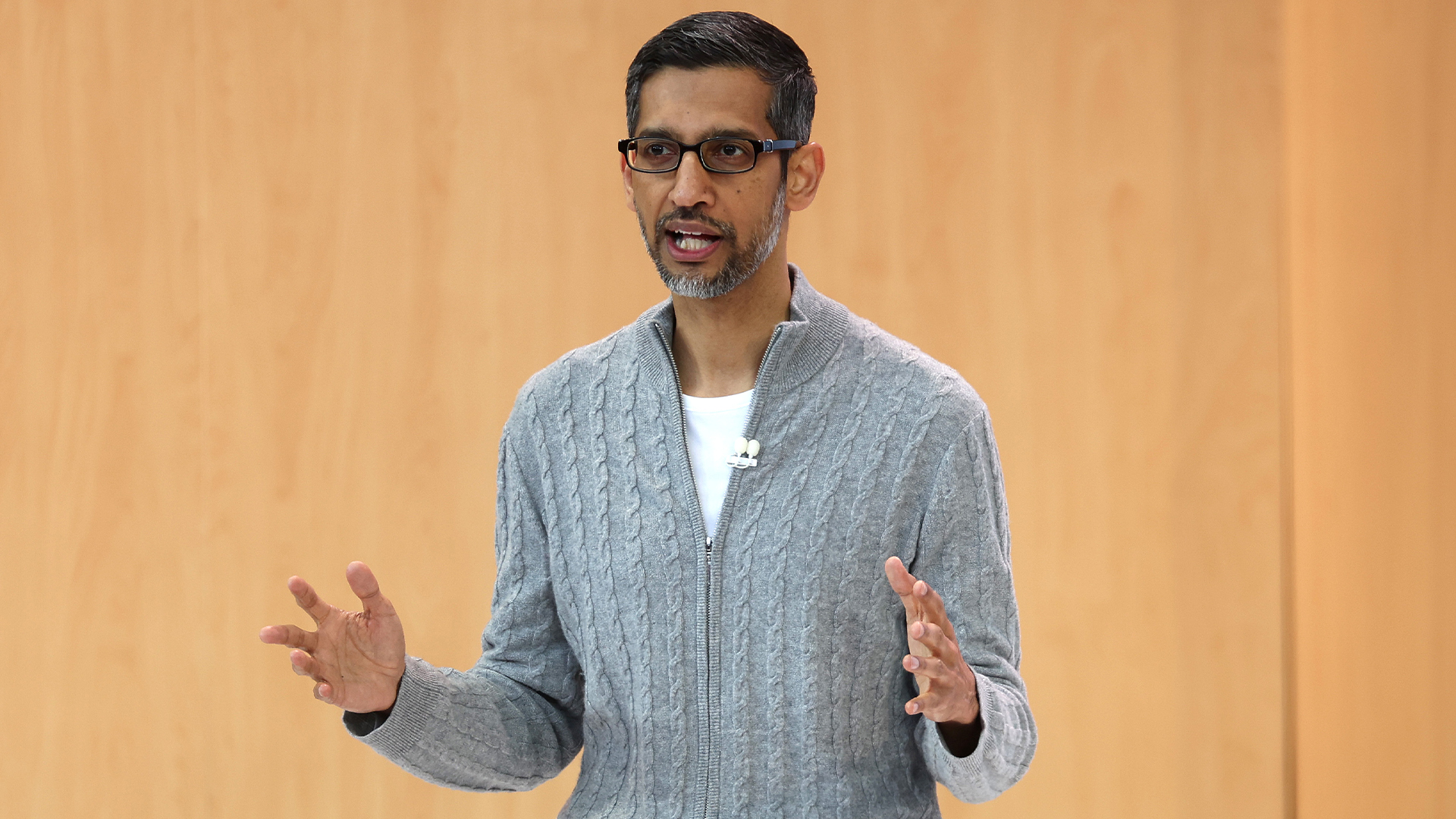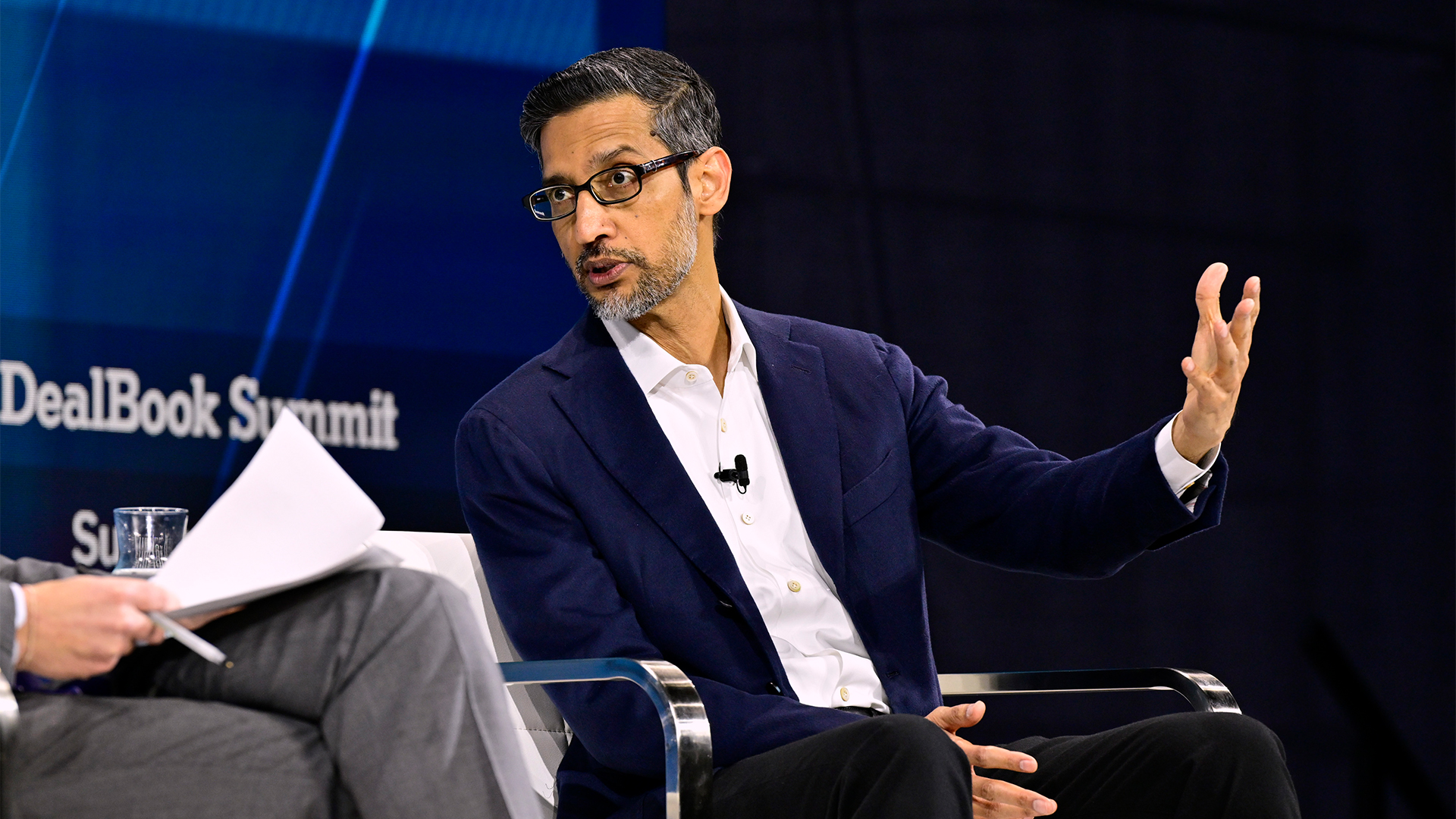Google CEO says more than 25% of the company's code is now AI-generated – is this the future of software development?
Google’s AI-generated code focus is a sign of the times in software development


Over a quarter (25%) of Google’s internal source code is AI-generated, according to CEO Sundar Pichai, hinting at what's in store for the future of development at big tech firms.
Speaking during a recent earnings call, Pichai explained that the firm is using AI within its development teams to improve coding processes, as well as to boost productivity and efficiency.
The code in question is subject to human approval, Pichai added, as engineers are kept in the loop to review and accept AI-generated code. This helps improve engineer workflows and allows them to move faster, he said.
Google’s AI source code forms part of its full-stack approach to the technology, which Pichai noted also involves rolling out its Gemini models more widely to developers and focusing on tools such as GitHub Copilot.
Google’s announcement is a sign of things to come, according to Camden Woollven, Group Head of AI Product Marketing at GRC International Group, though it might take time for the entire industry to catch up.
“Google's got advantages other companies don't, such as massive code repositories, cutting-edge AI tools, and the resources to implement this safely,” Woollven told ITPro.
“Most companies won't hit 25% anytime soon, but they're definitely heading in that direction.”
Sign up today and you will receive a free copy of our Future Focus 2025 report - the leading guidance on AI, cybersecurity and other IT challenges as per 700+ senior executives
It’s also important to put the headline statistic in context, Woollven said. While 25% of Google’s code is AI-generated, this doesn’t mean AI is writing full systems from scratch - rather, it’s complementing human development.
AI coding tool uptick
News of Google’s sizable AI code portfolio comes as research increasingly points to the growing popularity of AI coding tools.
According to a GitHub report that surveyed 2,000 software engineers and developers, 97% said that they had used AI coding tools at work at some point. Many of the surveyed developers also reported better code quality and faster language adoption.
A similar survey from Black Duck Software found that nine-in-ten developers reported using AI coding tools, with some of the most enthusiastic adopters working in technology and cybersecurity.
This uptick could have major implications for application development, according to Manoj Chaudhary, CTO of Jitterbit.
RELATED WHITEPAPER

"Traditionally, building applications required dedicated developers, creating a bottleneck for businesses with limited resources. This meant a long tail of unmet needs, with countless applications left unbuilt due to the dependence on centralized IT teams,” Chaudhary told ITPro.
“AI is now breaking down these barriers. AI-powered tools are lowering the barriers to entry, allowing anyone with a basic understanding of what’s needed to automate tasks and processes,” he added.
Chaudhary argued that AI coding tools can democratize automation and create more agile, more productive environments.
Question marks over AI code
Despite the apparent surge in AI code generation, the industry is not without its concerns. Reports show that many developers question the quality of AI-generated code and its maintainability.
According to a report from Google itself, 39% of surveyed developers do not trust and lack confidence in AI-generated code, despite three-quarters (75%) using AI for at least one daily responsibility.
Other research from GitClear, for example, found concerning trends around maintainability in 153 million lines of examined code, predicting that ‘code churn’ - code that must be changed after its completion - could double in 2024.
Black Duck’s research also pointed toward growing developer worries in this regard, with two-thirds of respondents noting they’re increasingly concerned about the security and safety of AI-generated code.

George Fitzmaurice is a former Staff Writer at ITPro and ChannelPro, with a particular interest in AI regulation, data legislation, and market development. After graduating from the University of Oxford with a degree in English Language and Literature, he undertook an internship at the New Statesman before starting at ITPro. Outside of the office, George is both an aspiring musician and an avid reader.
-
 DeepSeek rocked Silicon Valley in January 2025 – one year on it looks set to shake things up again with a powerful new model release
DeepSeek rocked Silicon Valley in January 2025 – one year on it looks set to shake things up again with a powerful new model releaseAnalysis The Chinese AI company sent Silicon Valley into meltdown last year and it could rock the boat again with an upcoming model
-
 Google’s Apple deal is a major seal of approval for Gemini – and a sure sign it's beginning to pull ahead of OpenAI in the AI race
Google’s Apple deal is a major seal of approval for Gemini – and a sure sign it's beginning to pull ahead of OpenAI in the AI raceAnalysis Apple opting for Google's models to underpin Siri and Apple Intelligence is a major seal of approval for the tech giant's Gemini range – and a sure sign it's pulling ahead in the AI race.
-
 Google DeepMind CEO Demis Hassabis thinks startups are in the midst of an 'AI bubble'
Google DeepMind CEO Demis Hassabis thinks startups are in the midst of an 'AI bubble'News AI startups raising huge rounds fresh out the traps are a cause for concern, according to Hassabis
-
 Google DeepMind partners with UK government to boost AI research
Google DeepMind partners with UK government to boost AI researchNews The deal includes the development of a new AI research lab, as well as access to tools to improve government efficiency
-
 Google blows away competition with powerful new Gemini 3 model
Google blows away competition with powerful new Gemini 3 modelNews Gemini 3 is the hyperscaler’s most powerful model yet and state of the art on almost every AI benchmark going
-
 Google CEO Sundar Pichai sounds worried about a looming AI bubble – ‘I think no company is going to be immune, including us’
Google CEO Sundar Pichai sounds worried about a looming AI bubble – ‘I think no company is going to be immune, including us’News Google CEO Sundar Pichai says an AI bubble bursting event would have global ramifications, but insists the company is in a good position to weather any storm.
-
 Businesses finding it hard to distinguish real AI from the hype, report suggests
Businesses finding it hard to distinguish real AI from the hype, report suggestsNews An Ernst & Young survey finds that CEOs are working to adopt generative AI, but find it difficult to develop and implement
-
 Some of the most popular open weight AI models show ‘profound susceptibility’ to jailbreak techniques
Some of the most popular open weight AI models show ‘profound susceptibility’ to jailbreak techniquesNews Open weight AI models from Meta, OpenAI, Google, and Mistral all showed serious flaws

